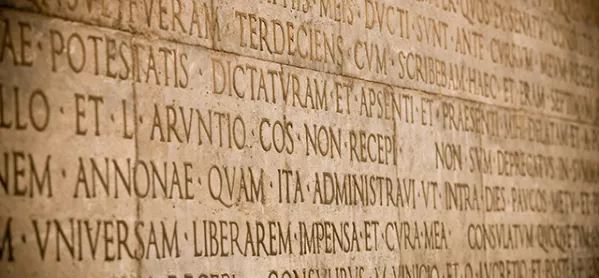As many schools take a fresh look at their curricula, a growing number of primaries are looking to introduce Latin.
Rising interest in curriculum and cultural capital seems to be sparking a resurgence of the ancient language in key stage 2.
The experience of language teaching in primary can be disjointed for many pupils - as they move from primary, they are often faced with either studying an entirely new language or starting the language they studied in key stage 2 from scratch.
Quick read: ‘Brexit or not, MFL cannot be optional for Britain’
Quick listen: ‘Phonics is crucial - even for those who won’t ‘get’ it’
Want to know more? Teachers’ promotion pitfalls (and how to sidestep them)
Latin could be a solution to these concerns.
A solid grounding in an ancient language provides a foundation for understanding how languages function and can provide particular insight into languages such as Spanish, French and Portuguese (the fastest growing option at GCSE).
If you want to take advantage of all that Latin has to offer, here are a few ideas that can help to make the most of introducing it to your school:
Get connected
Contact an organisation such as Classics For All to access free training and help you connect with a local hub of schools teaching Latin. The chances are that there will already be schools teaching the subject near you who may be happy to offer guidance to get you started.
Know your staff
Find out if any staff have expertise in this area. You may be surprised by how many of them have a Latin GCSE or an interest in the language cultivated through a love of history, linguistics or even the Harry Potter stories, which are rich in classical references (Potter connoisseurs will of course know that the expelliarmus spell used to disarm opponents combines the verb “expellere” (to expel) with “arma” meaning “weapon”.)
Sell the advantages
Latin is very accessible for teachers who are self-conscious about pronunciation and accent. With Latin, the emphasis is less on conversational language and more about the study of the written language alongside developing an appreciation of classical civilisations.
It is perhaps worth noting that there are fewer national curriculum statements set out for studying ancient languages, which means that, in an already jam-packed curriculum, teachers can focus on a smaller number of areas in greater depth.
Capitalise on etymology
With around 50 per cent of the English language stemming from Latin roots, there are rich opportunities for exploring etymology across many subject disciplines.
For example, in science the term “vibrate” derives from the Latin “vibrare”, which, of course, can help to clarify the meaning of the term “vibrato” in music.
In English, when we read a description of a “vibrant city” we might then conjure up an image of a place pulsating with energy and life.
Exploit links with the history curriculum
Pupils may spend six weeks studying the Roman empire in key stage 2, but this content is rarely revisited as they progress through school.
The ongoing study of Latin furnishes teachers with rich opportunities to revisit and embed learning about the Roman world over time.
While there are obvious linguistic and cultural benefits to teaching Latin, the idea may initially sound a little highbrow and rarefied.
If you are feeling at all hesitant perhaps bring to mind the Latin proverb “audentes fortuna iuvat” or more simply put, fortune favours the bold.
Andrew Percival is deputy headteacher at Stanley Road Primary School in Oldham




